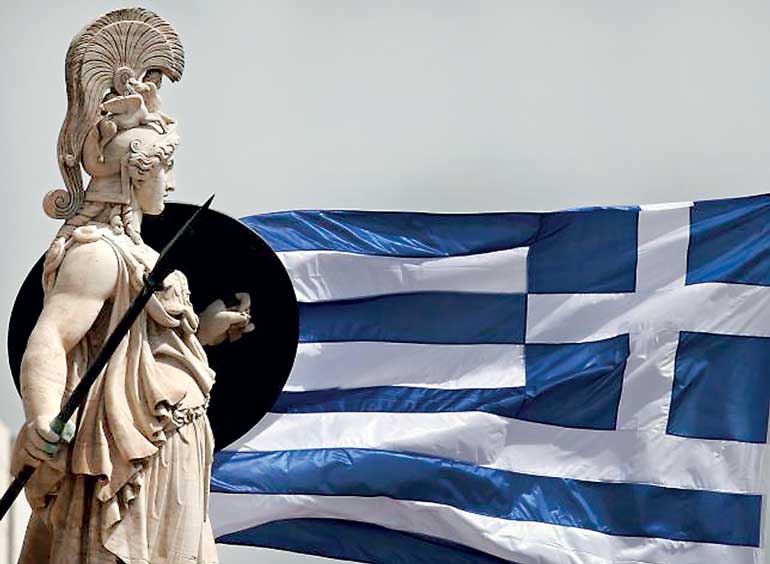Saturday Feb 21, 2026
Saturday Feb 21, 2026
Wednesday, 27 May 2015 00:46 - - {{hitsCtrl.values.hits}}

A Greek national flag flutters next to a statue of ancient Greek goddess Athena, in Athens May 21, 2015 - REUTERS
Greece intends to make good on its debt obligations but needs aid urgently to be able to do so, the government said on Monday, after several senior officials insisted Athens had no money to pay a loan instalment falling due next week.
Shut out of bond markets and with bailout aid locked, Greece is running out of cash to pay its bills. It must repay four loans totalling 1.6 billion euros ($1.76 billion) to the International Monetary Fund next month, starting with a 300 million euro payment on June 5 that is seen as the next crunch point for state coffers.
Athens has the money to make monthly wage and pension payments this week, government spokesman Gabriel Sakellaridis told a news conference. But he was less direct when asked about the June 5 payment, reiterating the government’s official stance that it has the responsibility to pay all its obligations.
“Based on the liquidity problems that we have, there is an imperative need for us and the euro zone to have a deal as soon as possible,” Sakellaridis said. “To the degree to which we are able to pay our obligations, we will pay our obligations. It’s the government’s responsibility to be in a position to pay all of these obligations.”
A growing list of senior members of the government -- the interior minister among them -- have openly said Athens does not have the means to pay the IMF, and would prioritise paying civil servants and pensioners instead.
“We haven’t got the money. We won’t pay. It’s that simple,” Deputy Foreign Minister Nikos Chountis, who holds the European affairs portfolio, told Greek TV on Monday.
Greek officials have frequently threatened to default in recent weeks, arguing the country does not have cash, which euro zone officials have dismissed as a negotiating tactic to raise pressure on creditors to disburse aid.
Adding pressure on the government, prominent opposition lawmaker Dora Bakoyianni said the country risked facing capital controls to stem deposit outflows if it did not reach a deal for aid with the government this week.
Sakellaridis dismissed such “doomsday scenarios”, saying there was “just no chance” of imposing capital controls. He also dismissed reports that the government would try to pay all its June obligations in one lump sum to the IMF.
He voiced optimism about a deal by early June but acknowledged that agreement on value-added tax hikes, pension and labour reform and lower primary surplus targets had yet to be found in negotiations with EU and IMF lenders.
Canadian financier and Fairfax Financial Holdings Chief Executive Prem Watsa met Prime Minister Alexis Tsipras on Monday and expressed confidence in the country’s recovery and on a deal with lenders, even “at the last minute”.
Fairfax owns a 13.6% stake in the Greek lender Eurobank.
“A deal is possible because it is the only logical solution and both sides need it,” Watsa told Eurobank and other officials, according to a statement from the bank.